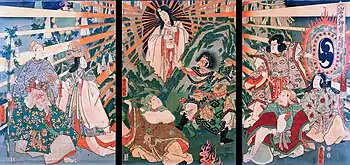天照
Japanese
| Kanji in this term | |
|---|---|
| 天 | 照 |
| あま Grade: 1 |
て(らす) Grade: 4 |
| kun’yomi | |
Etymology
From Old Japanese. Mentioned in the Man'yōshū of 759 CE.[1][2]
Superficially, a compound of 天 (ama, “sky, the heavens”) + 照らす (terasu, “to illuminate something, to shine upon something”). However, this derives instead as an honorific form of compound verb 天照る (amateru, “to shine in heaven”), as the 照らす (terasu) is not the usual transitive or causative conjugation of the intransitive verb 照る (teru, “to shine, to light up”), but rather an example of the verb with the Old Japanese honorific verb suffix す (-su).[3][4][5]
As a verbal epithet, also found in some older texts with the reading Amaderasu,[3][4] where the terasu changes to derasu as an instance of rendaku (連濁). The name appears to be consistently used without voicing, as Amaterasu.[6][7]
Pronunciation
- IPA(key): [a̠ma̠te̞ɾa̠sɨᵝ]
Proper noun
天照 or 天照 • (Amaterasu)
Verb
天照 or 天照 • (amaterasu or amaderasu)
Usage notes
As an epithet, conjugated forms do not appear to be common, and where used, the okurigana are explicitly spelled out.
References
- Shōgaku Tosho (1988) 国語大辞典(新装版) [Unabridged Dictionary of Japanese (Revised Edition)] (in Japanese), Tōkyō: Shogakukan, →ISBN
- , text available online here
- “天照す”, in 日本国語大辞典 (Nihon Kokugo Daijiten, “Nihon Kokugo Daijiten”) (in Japanese), concise edition, Tōkyō: Shogakukan, 2000
- “天照らす”, in デジタル大辞泉 [Digital Daijisen] (in Japanese), Tōkyō: Shogakukan, updated roughly every four months
- Matsumura, Akira, editor (2006), 大辞林 [Daijirin] (in Japanese), Third edition, Tōkyō: Sanseidō, →ISBN
- “天照大神・天照大御神”, in 日本国語大辞典 (Nihon Kokugo Daijiten, “Nihon Kokugo Daijiten”) (in Japanese), concise edition, Tōkyō: Shogakukan, 2000
- “天照大神”, in デジタル大辞泉 [Digital Daijisen] (in Japanese), Tōkyō: Shogakukan, updated roughly every four months
